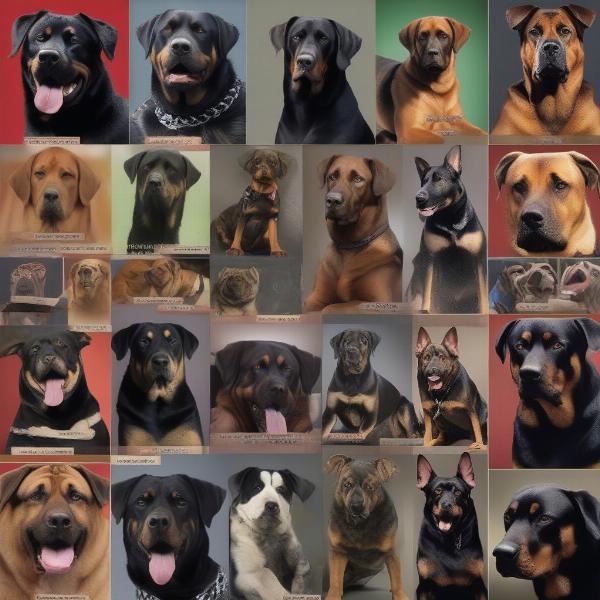The term “chaos war dog” often conjures images of unruly, aggressive canines bred for combat. However, this perception is largely a myth. While the term itself lacks a precise historical definition, it’s often used in fictional contexts to describe powerful, intimidating dogs. This article will delve into the realities behind the “chaos war dog” concept, exploring the potential breeds that might inspire such a portrayal, and importantly, focusing on responsible dog ownership and training for any breed, regardless of its perceived power.
There is no officially recognized “chaos war dog” breed. The term is a modern invention, often used in video games, fantasy literature, and online communities. It often evokes images of large, muscular breeds like Rottweilers, Doberman Pinschers, or Mastiffs, perhaps adorned with spiked collars and intimidating armor. However, a dog’s temperament is shaped more by training and socialization than by inherent aggression. Even breeds with a history of guarding or protection work can be loving companions in the right hands.
Unveiling the Potential Breeds Behind the Myth
While “chaos war dog” isn’t a real breed, certain breeds might lend themselves to the imagery. These are typically large, powerful dogs with a strong protective instinct:
- Rottweilers: Known for their intelligence and loyalty, Rottweilers can be excellent guard dogs with proper training and socialization.
- Doberman Pinschers: Elegant and athletic, Dobermans are intelligent and highly trainable, making them suitable for various canine activities, including protection work.
- Mastiffs: These gentle giants are known for their imposing size and calm demeanor. While protective of their families, they are generally not aggressive.
- German Shepherds: Highly intelligent and versatile, German Shepherds excel in various roles, including police and military work.
 Các giống chó thường được liên tưởng đến chó chiến hỗn loạn
Các giống chó thường được liên tưởng đến chó chiến hỗn loạn
Responsible Ownership and Training: The Key to a Balanced Dog
Regardless of breed or perceived “power,” responsible ownership and consistent training are crucial for raising a well-behaved and balanced dog. This includes:
- Early Socialization: Exposing puppies to various sights, sounds, people, and other animals helps them develop into confident and well-adjusted adults.
- Positive Reinforcement Training: Rewarding desired behaviors with treats, praise, or toys is a highly effective way to teach obedience and build a strong bond.
- Consistent Boundaries and Rules: Establishing clear rules and expectations helps dogs understand what is expected of them, preventing confusion and behavioral issues.
- Mental and Physical Stimulation: Providing ample opportunities for exercise and mental enrichment, such as puzzle toys and training sessions, helps prevent boredom and destructive behaviors.
Is a “Chaos War Dog” Right for You?
The idea of a “chaos war dog” is often romanticized, but the reality of owning a powerful dog requires significant responsibility and commitment. Before considering any breed, especially larger ones, carefully assess your lifestyle, experience, and ability to provide the necessary training and care. Remember, owning a dog is a privilege, not a right, and every dog, regardless of its breed, deserves a loving and responsible home.
Conclusion
The “chaos war dog” remains largely a fictional concept. While certain breeds might contribute to the image, a dog’s behavior is primarily shaped by its environment, training, and socialization. Focus on responsible ownership, consistent training, and providing a loving home, and any dog can become a well-adjusted and cherished companion. Remember, responsible pet ownership requires commitment and dedication, regardless of breed.
FAQ
- Does the “chaos war dog” actually exist? No, it’s a fictional term.
- What breeds are often associated with the “chaos war dog” image? Rottweilers, Doberman Pinschers, Mastiffs, and German Shepherds.
- Are these breeds inherently aggressive? No, their temperament is largely influenced by training and socialization.
- How can I ensure my dog is well-behaved? Early socialization, positive reinforcement training, and consistent boundaries are key.
- Is a powerful dog breed right for me? Consider your lifestyle, experience, and ability to provide proper care and training.
chaos war dogs
dog bubbles peanut butter
puppy dog charm
dog man grime and punishment summary
this is fine dog funko
ILM Dog is a leading international pet care website dedicated to providing expert advice and resources for dog owners worldwide. We cover all aspects of dog care, from breed selection and health to training and nutrition. Whether you’re a seasoned dog owner or just starting out, ILM Dog offers valuable insights to help you provide the best possible care for your canine companion. For expert guidance on dog breeds, training, and health, contact us at [email protected] or call us at +44 20-3965-8624. Visit us at ILM Dog for more information.